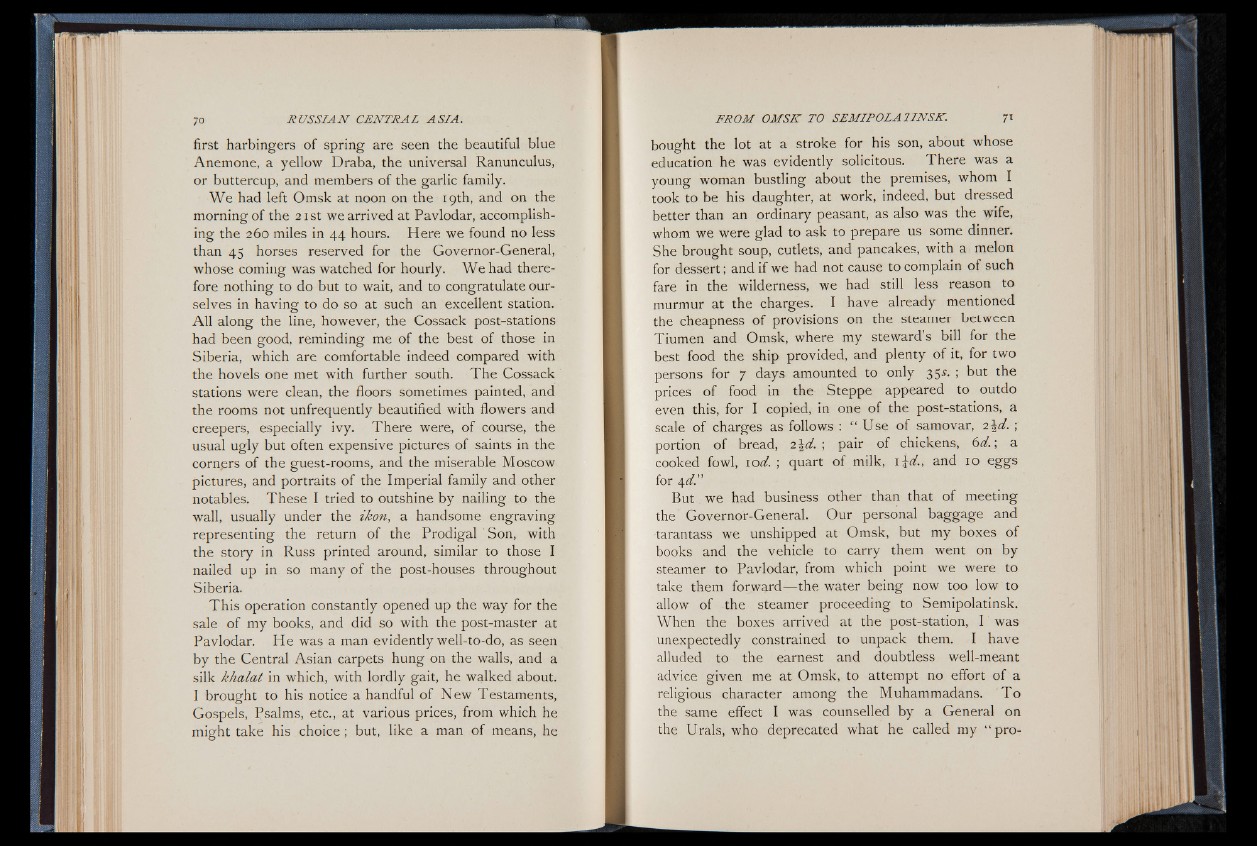
first harbingers of spring are seen the beautiful blue
Anemone, a yellow Draba, the universal Ranunculus,
or buttercup, and members of the garlic family.
We had left Omsk at noon on the 19th, and on the
morning o f the 21 st we arrived at Pavlodar, accomplishing
the 260 miles in 44 hours. Here we found no less
than 45 horses reserved for the Governor-General,
whose coming was watched for hourly. We had therefore
nothing to do but to wait, and to congratulate ourselves
in having to do so at such an excellent station.
All along the line, however, the Cossack post-stations
had been good, reminding me of the best of those in
Siberia, which are comfortable indeed compared with
the hovels one met with further south. The Cossack
stations were clean, the floors sometimes painted, and
the rooms not unfrequently beautified with flowers and
creepers, especially ivy. There were, of course, the
usual ugly but often expensive pictures of saints in the
cornprs of the guest-rooms, and the miserable Moscow
pictures, and portraits of the Imperial family and other
notables. These I tried to outshine by nailing to the
wall, usually under the ikon, a handsome engraving
representing the return of the Prodigal Son, with
the story in Russ printed around, similar to those I
nailed up in so many of the post-houses throughout
Siberia.
This operation constantly opened up the way for the
sale of my books, and did so with the post-master at
Pavlodar. He was a man evidently well-to-do, as seen
by the Central Asian carpets hung on the walls, and a
silk khalat in which, with lordly gait, he walked about.
I brought to his notice a handful of New Testaments,
Gospels, Psalms, etc., at various prices, from which he
might take his choice; but, like a man of means, he
bought the lot at a stroke for his son, about whose
education he was evidently solicitous. There was a
young woman bustling about the premises, whom I
took to be his daughter, at work, indeed, but dressed
better than an ordinary peasant, as also was the wife,
whom we were glad to ask to prepare us some dinner.
She brought soup, cutlets, and pancakes, with a melon
for dessert; and if we had not cause to complain of such
fare in the wilderness, we had still less reason to
murmur at the charges. I have already mentioned
the cheapness of provisions on the steamer between
Tiumen and Omsk, where my steward’s bill for the
best food the ship provided, and plenty of it, for two
persons for 7 days amounted to only 35^. ; but the
prices of food in the Steppe appeared to outdo
even this, for I copied, in one of the post-stations, a
scale o f charges as follows : “ Use of samovar, 2 \d. ;
portion of bread, 2 \d. ; pair of chickens, 6d.\ a
cooked fowl, 10d. ; quart of milk, 1 \d., and 10 eggs
for 4d."
But we had business other than that of meeting
the" Governor-General. Our personal baggage and
-tarantass we unshipped at Omsk, but my boxes of
books and the vehicle to carry them went on by
steamer to Pavlodar, from which point we were to
take them forward— the water being now too low to
allow of the steamer proceeding to Semipolatinsk.
When the boxes arrived at the post-station, I was
unexpectedly constrained to unpack them. I have
alluded to the earnest and doubtless well-meant
advice given me at Omsk, to attempt no effort of a
religious character among the Muhammadans. T o
the same effect I was counselled by a General on
the Urals, who deprecated what he called my “ pro